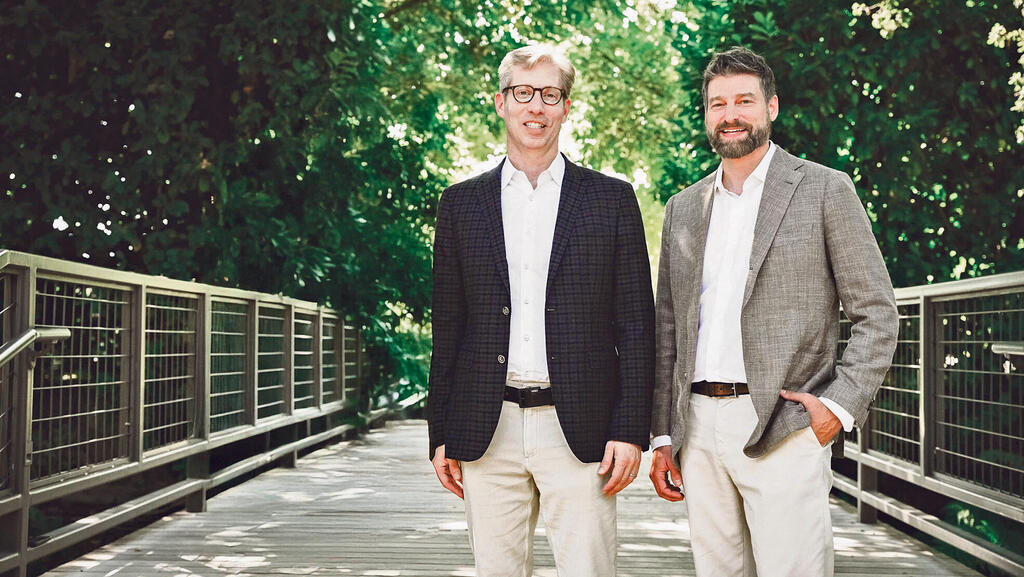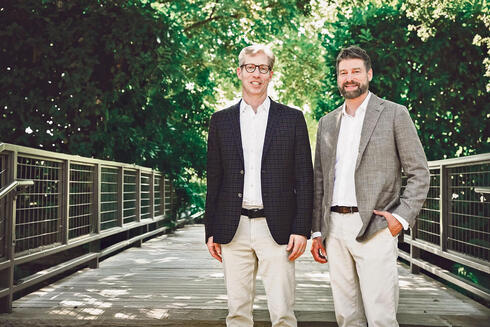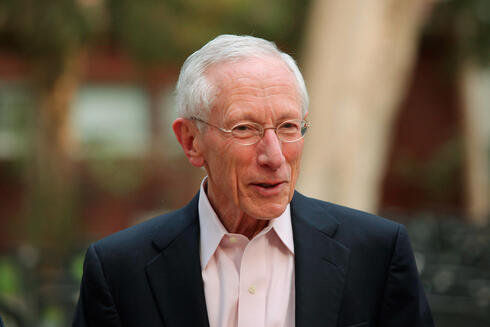
How Facebook’s former CRO and Twitter’s top brass are betting big on Israel
Stanley Fischer’s son, David, and his Silicon Valley partners at 01A are doubling down on Israel, funding seven startups so far and scouting dozens more.
“When my father accepted the offer to serve as Governor of the Bank of Israel, many people around him raised an eyebrow. One of his friends even asked him if he was really going to leave a senior position on Wall Street to run the central bank of an economy about the size of New Jersey. But that friend missed the point, the depth of my father’s connection to Israel, a connection that began in his youth. Israel and its economy were his mission. His time as governor not only marked the peak of his career but also expressed his essence as a person: the combination of deep academic knowledge and practical experience, boldness and public responsibility. He led during times of global crisis with courage, modesty, and wisdom, and delivered extraordinary results,” says David Fischer, partner at the venture capital fund 01A and son of Stanley Fischer, who passed away two weeks ago.
The interview took place just days before the former Bank of Israel governor died at the age of 81 after a long illness, while David Fischer was on a working visit to Israel. “For many he was a mentor, a role model, even a ‘rock star’ of central banking, but for me he was first and foremost a father - a wonderful, loving, wise, and caring father,” Fischer says. “He was an extraordinary man who lived an extraordinary life, from a small village in Zambia to the world’s leading universities, to the heights of the global economy. He was an academic at heart, endlessly curious, a man who loved ideas and loved people. He collected books and journals with the same passion with which he sought answers to the great economic questions of our time. He loved to learn, loved to teach, and he never hesitated to admit when he was wrong, and to change his mind accordingly.”
Your father’s name probably helps open doors here.
“Maybe my father’s name helps get a foot in the door, but Israelis are tough. No one will take an investment from the fund just because of my last name, everyone is thorough and wants to know what I can do for them,” says Fischer. His tone is calm, but the sarcasm is reminiscent of his father, who headed the Bank of Israel during the 2008 crisis and is credited with limiting its impact on Israel. Fischer was also the first central bank governor in the world to raise interest rates in 2009, signaling the end of the global crisis. After completing two terms at the Bank of Israel, he was appointed by then-US President Barack Obama as Vice Chairman of the US Federal Reserve, a position he held until his retirement in 2017 at age 74.
David Fischer, his middle son, has two brothers, one is a doctor, the other held senior management roles in the American entertainment industry. When David was a child, the family often lived in Jerusalem while his father taught at the Hebrew University.
But David Fischer doesn’t really need his father’s name to open doors to Israel’s hottest startups. The 01A fund, or 01 Advisors, is so named because all three partners bring deep experience from top roles in American tech, with a strong focus on marketing, sales, and operations. They know what to do because they’ve done it themselves.
Fischer made his mark when he moved from Google to Facebook in 2010 and helped boost the company’s revenue from almost nothing to $120 billion by the time he left his role as CRO in 2021. He then joined 01A as the third partner alongside Dick Costolo, former CEO of Twitter, and Adam Bain, Twitter’s former Chief Operating Officer and President, who also previously served as its CRO.
Long before Elon Musk, Costolo and Bain scaled Twitter’s sales to $2 billion a year before leaving to launch 01A in 2017. They raised their first fund in 2019 and brought Fischer onboard in 2021. They like to joke that together they have a combined sales track record of $123 billion, $121 billion of it thanks to Fischer. All three were senior executives when their companies went public and know how Silicon Valley operates from the inside. Since leaving big tech, they’ve raised nearly $1 billion for three funds and invested in 70 companies, about 10% of them Israeli, even before Fischer, their “Israel connection,” joined. Notably, none of these investments is in social media.
At a time when most airlines were canceling flights to Israel, Fischer and Bain flew in, partly to meet Israeli investors in their fund, but mostly to scout new startups. In an interview with Calcalist, they said they met nearly 25 startups during the trip, so more Israeli companies are likely to join their portfolio soon.
Neither the war in Gaza, which has dragged on for nearly two years, nor the sudden escalation with Iran, deters Fischer. “I really hope to invest in more Israeli startups following these meetings. Even before the conflict with Iran, there was strong interest in defense tech, and now that trend will only grow. I’m especially impressed by how Israeli founders not only continue to build remarkable companies during this time but also put huge effort into supporting their communities. I met a group of Israeli founders in New York just before the Iran conflict, and when I checked in on them afterward, I was struck by how determined they were to return home, ensure their employees’ safety, and keep their businesses moving forward. Since October 7, I’ve admired how Israeli startups manage to contribute to the country while building resilient businesses. Many founders have told me they’re more determined than ever, and it shows.”
Related articles:
01A’s first Israeli investment, in the fintech company Tipalti, happened entirely by chance, before Fischer joined. “When Twitter was still just another startup, we ran into a problem with invoices and collections. It was 2013, right before the IPO, and if we didn’t fix it, we couldn’t go public. Tipalti solved the mess in under a month,” Bain recalls.
Since then, they’ve backed Israeli companies like Navan, HoneyBook, Papaya, Zafran, and others. Their most recent major exit also had an Israeli angle: the sale of cybersecurity company Protect AI to Nir Zuk’s Palo Alto Networks for over half a billion dollars.
01A writes relatively large checks, typically $15–20 million, and usually joins in Series B rounds, once a startup has a product ready to scale and founders who need help selling it. Their current fund, the third, totals $395 million and closed in November 2023.
“We like to meet founders as early as possible, ideally at their first big round. The longer we know them, the clearer it is whether we can help,” says Bain. “We’d known Protect AI’s founder for 20 years before we invested. Usually, when we join, we’re the only new money in the round. Our focus is to build out the company’s marketing and sales strategy, we want to be the first call when a founder is planning the round.”
“Today, startups get to their first sales much faster than before, it almost looks easy. But jumping from $5 million to $50 million or $100 million in revenue is the real challenge, and that’s where most fail,” Bain adds. “We’ve seen it all, we know what works in sales and what doesn’t. You can have a great product and a stellar team, but if you can’t sell, it won’t work. Israeli founders in particular often struggle to sell, partly because they’re far from their main markets and come from technical backgrounds, and partly because they lack the networks American founders build in university. Branding and marketing matter more than ever now, because AI makes it easier to close the technical gap between competing products.”
How do you handle the specific challenges facing your Israeli portfolio companies?
Fischer: “Interestingly, our Israeli startups have delivered our highest returns so far. But it’s true: Israeli founders, even experienced ones, still find it harder to break into the U.S. market. They need help getting introductions to customers and hiring sales leaders.
“Israeli startups tend to sell to small businesses or other startups at first, because it’s easier, but that’s not always right for the product. Some should target many SMBs; others should focus on a few large enterprises.
“Because of AI, everything happens faster now. Startups reach these critical junctures sooner and need to make big decisions earlier. Despite the stereotype, Israeli founders are very open to advice, especially repeat founders who’ve learned how costly sales and operational mistakes can be.
“Ironically, first-time founders reach out less. It’s the serial entrepreneurs who ask the hard questions. Israelis are different from Americans, they’re more decisive and bold, partly because they’re older and more seasoned from military service, while Americans often come straight from academia or big companies. Israelis handle pressure better and push through. American founders can be more ‘childlike.’ That’s why we want to see more Israeli companies go all the way, not just with breakthrough tech, but with winning businesses.”
When is it too late for you to invest in a company?
Fischer: “We don’t come in to fix things, that’s for private equity funds. We come in when the business is ready to take off, so we can help it scale.”

